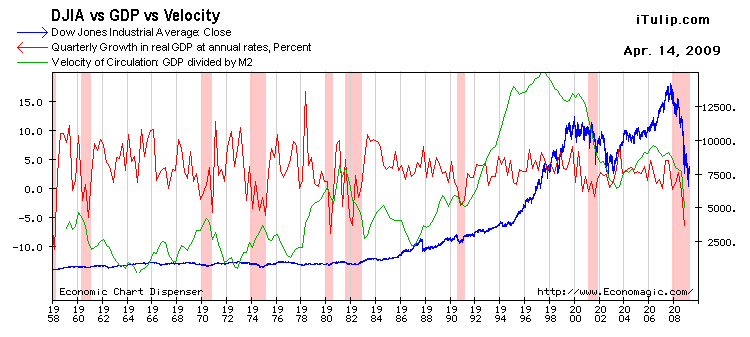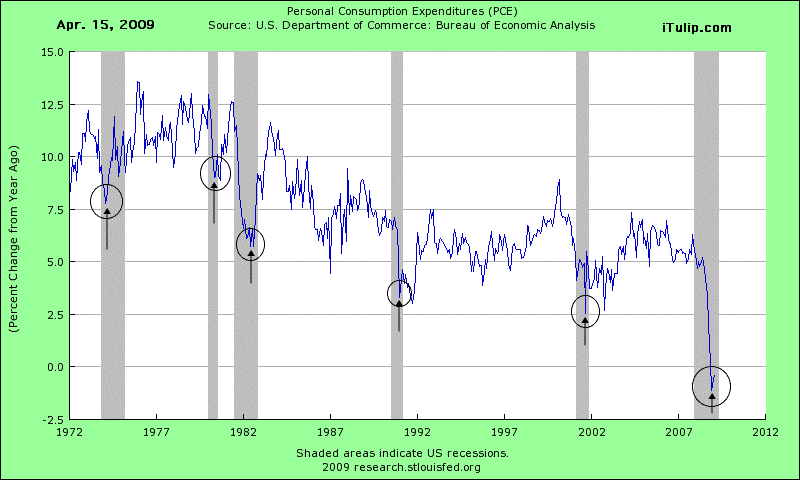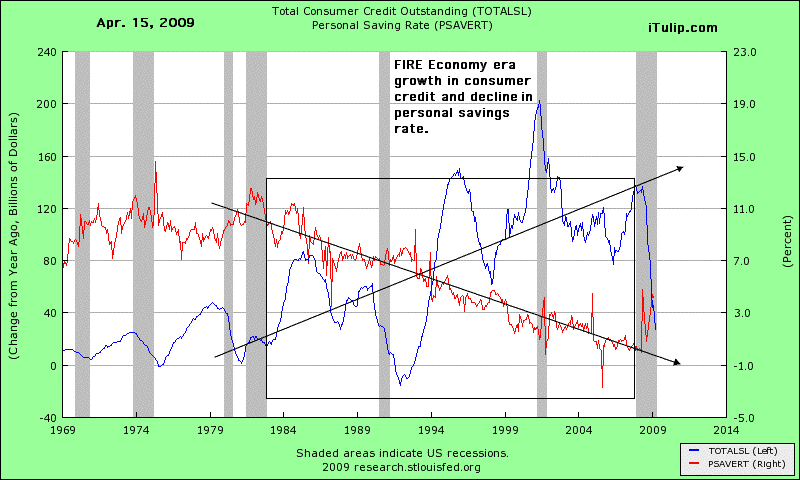 |
“Mud sometimes gives the illusion of depth.” - Marshall McLuhan
Is the global stock market rally signaling the end of a worldwide race to the bottom via debt deflation or only making a pit stop? When 43 countries pour a combined $2.2 trillion of fiscal stimulus cash into their economies in six months, shoveling debt from private to public account like the desperate crew of a sinking ship bailing in shark infested waters, and the U.S. alone lending more than $10 trillion to banks and financial institutions to keep them solvent, how can the economy not stop contracting, if only until the 2010 Congressional elections?
The question from here is what happens to the economy after the public money is spent as the bailed out zombie banks that should have been allowed to fail instead stagger and stumble in a stupor? What future awaits the few remaining too-big-to-fail banks that are able to eek out a meager profit only after the government offers the raw product – debt – at a ridiculously discounted wholesale price, with a marketing campaign to retail debt buyers that includes the President of the United States, special mortgage programs, everything but a list of customers to call -- although for all we know they got that, too. For reasons that remain a mystery to us, market participants read this as a bullish sign for the economy.
In the case of the U.S. in 1938 and Japan in 1992, debt-laden economies struggling with over-capacity quickly slipped back into depression once the fiscal juice wore off. Without a shred of proof to support the theory that economy-wide price fixing of capital and under-pricing of debt by governments through manipulation of interest rates cures the economic ills caused by previous price fixing and debt subsidy schemes, global Keynesian stimulus as an alternative to debt cancellation is a triumph of ideology over evidence that will end in inflationary tears. Shall we as investors go all-in with the bulls to play the intermediate results of the fiscal fantasy plan in execution -- the stock market rallies and the price distortions in bonds and commodities -- or a solid position for the end game with the doomers, wait it out with bars of gold, a sidearm, and a case of Scotch? Is there a rational position to take between these extremes?
Before we delve into these questions, first we take note of revelations that have surfaced during the acute phase of the crisis before they are subsumed in the atmospherics of a “recovery” that only a few trillion in borrowed, un-repayable money can buy.
Foul waters
In the vast, raging deluge of falsehoods, fantasies, fabrications, and fake-outs that passes for news in the U.S., the river of informational sewage that collects in drips and spews from ducts and runoff of coin operated media outlets, occasional shimmering snippets of verified truth from immaculately credible sources bob improbably among torrential turd-waves of propaganda, hoopla, and fluff. From a perch at the shore they enter our field of vision and drift by like an immaculate flotilla of shimmering white swans on a river of shit, their incongruous beauty commanding our shocked attention.
We crane our necks to catch every detail, to savor the vision of purity and grace before it is washed down river to churn out into the deep, green sea of essential knowledge – after decades so polluted by deceit, deception, dishonesty, and distortion that we can no longer see the bottom. Lost and long forgotten, like Garret Garrett's 1932 global credit bubble classic The Bubble that Broke the World, waiting to be dug up by the next generation of historians after its credit bubble collapses, leading them to ask, “Do we never learn?”
Nah.
Swans of truth, if you will, authentic and exact, flock in periods of crisis. The economics of the news business compels it. The sleepwalking masses awake demanding an explanation for what the hell happened, preferably short and not too far from preconception, the shortest path from ephemeral awareness to a return to perpetual civil slumber. Audiences swell. But do not mistake the temporary improvement in water quality as the result of a permanent installation of pollution controls. Historic revelations of fact can be lost like lint, as a car can be buried as well as a cat; it just takes more dirt.
Now that the “crisis has passed,” the “economy has bottomed” and a “recovery” is underway we see Jim Cramer return to lead the charge, laughing off a slap-down that optimists only weeks ago deemed fatal to his career as the lead carnival barker of the FIRE Economy. Such critiques are now delivered by the last serious journalists a corporatist state gives a national stage: comedians. Clare Booth Luce once said of news reporting, if it isn’t pissing someone off, it’s advertising; the only people Cramer maddens are those sad sacks among his audience who mistake his act for investment advice.
More than a year into the economic collapse, numb to financial disaster, news audiences clamor for the positive. The extended marketing and PR arm of the FIRE industry that is the national financial press is only too happy to fabricate it if no truthful evidence is handy. It comes in a flurry of fantasy reports of economic recovery without economic rehabilitation, of market bottoms without markets, and assertions that the worst is over as home foreclosures surge, industrial production collapses and retail sales, incomes, and consumption fall in the wake of the collapse of the FIRE Economy in Q4 2008.
Good news is delivered by the very same market and economic analysts who insisted before the crisis that none was imminent and claim to this day that our economic devastation, with its jaw dropping statistics, is not as bad as it looks. Financial news reporting is one of the few professions in America that allows its practitioners to enhance their reputations as experts by perfecting a record for failure.
Big bang, with fallout
The pipelines feeding the FIRE Economy alit when falling housing prices starting in 2006 took out the CDO models and blew out the market for securitized mortgage debt in the first quarter of 2007. After a series of smaller explosions that detonated lesser stores of financial accelerants, the flames reached the main storage tanks holding the mother load of financial fuel – asset-backed securities and agency debt -- and blew up spectacularly in the closing quarter of 2008 (see Flow of Funds Q4 2008: Debt Deflation confirmation). The catastrophic explosion sent anyone not already in gold and U.S. Treasury bonds running for cover. A few months later, the pressure and heat gauges on the pipelines began to return toward normal, but the damage was done. Ash followed the shrapnel that landed first. After the rumbling subsided, investors uncurled from fetal positions to survey the disaster scene, an economic landscape covered bankruptcies and layoffs.
Everything is entertainment in America: the Somalis pirates, the President’s dog, Mexican drug wars, Paris Hilton, the mass destruction of a generation’s savings, Susan Boyle, and the looting of our treasury each get equal coverage. Scratch that. We’ll hear more about the dog, Paris, and Susan, but at least Susan deserves it. The crash itself provided a hot new topic for doomertainment; economic collapse, like a war the American government started raging in some distant country that most Americans cannot find on a map, is an abstract concept here. “What does that have to do with me?” wonders an American TV viewer absorbed in working out the most likely remaining cast members of the latest episode of Survivor as the county sheriff tapes a foreclosure notice to the door. But as winter turns to spring, the knock on effects of the financial crisis move from the headlines to the front lines of the economy, from abstract to the personal, and soon from the personal to the political.
Will the revelations of fact soon be buried in the river of mud as in the past? If so, before that happens, while still fresh in our minds, before the sense of crisis – the forcing function for truth -- subsides and the powerful myth of the government financed “recovery” dispels our hard earned wisdom, we drag these facts back upriver with our little tugboat, against the flow, and hold them here for one final inspection before they disappear into the deep.
Crash revelations, before you forget
The acute period of financial and economic crisis in the final months of 2008 launched staccato revelations that opened eyes to a world beyond the fantasy the river of news crud portrays. Simon Johnson told us the nation is run by a financial oligarchy. Bill Black told us the Treasury Department’s banking system bailout is a fraud designed to hide the fraud behind the financial crisis. Two years into the housing bubble and two years before it ended, in 2004 the FBI warned of mortgage fraud 'epidemic' and in March 2009 that Stimulus, bailout will lead to more fraud. Black points out that after the S&L crisis and bursting of the stock bubble in 2000 there were a significant number of investigations into criminal wrongdoing and accounting fraud, yet two years into the current financial crisis began the FBI "doesn't have a single major conviction or indictment of anyone.” So far the only miscreants of the financial debacle to be prosecuted are those who, like Bernie Maddoff, turned themselves in. To get arrested for financial crimes today it seems you need to walk into a police station with your hands up and yell, “Arrest me! I’m a crook!” and even then you will be asked to produce corroborating evidence.
The FBI says it needs money to hire more agents: Mortgage fraud caseload is overwhelming agency. Get in line, boys. As federal, state, and local tax receipts evaporate with falling incomes and asset prices, political competition for diminishing cash flows from business and household income heats up: "With the size of our budget gap, we are looking at a situation of closing down our courts, releasing prisoners and cutting the school year by as much as a month," said Rep. Peter Buckley, co-chairman of Oregon's joint Ways and Means Committee.
Streets flooded with “criminal” pot smokers? Students freed early from their indoctrination pens? The horror! Take that, Tea Party tax revolters! We’ve been preparing our readers for year for a pitched battle for their cash flow and savings as banks demand interest be paid before taxes and all other claims, marketed as “keeping homeowners in their homes,” and state and local government attach fees onto every bag of trash and line painted on the road, and the Treasury prints and the Federal Reserve drops money from helicopters, without a believable plan to vacuum it back up again.
Recovery without rehabilitation?
The cornerstone of the economic recovery story is the fallacy that the stock market can see into the future, and that today’s rising stock market foretells economic recovery.
A review in of past recessions reveals that stock markets are blind to the onset of recession, fall coincident with economic contraction, and recover coincident with economic growth, sustained or temporary.
In the current instance, the Debt Deflation Bear Market started at the same time as the collapse of the FIRE Economy at the end of Q4 2007, as iTulip forecast in October 2006. Debt deflation has followed ever since. Stock market participants do not understand the dynamics of the FIRE Economy or debt deflation. That has been good news for us: such widespread confusion is tradable.
The correlation of stock market performance and recessions since the 1960 recession is the story of the Federal Reserve killing off expansions with short term interest rate hikes and successfully restarting of the economy by re-inflation of credit following rate cuts, some of the badness wrung out in the process, especially bad debts. Stock markets anticipate the money-fueled recovery and take off before the economy does. We look into the past seven recessions to see how the story holds up.

Three observations hold for every recession since 1960. One, the stock market (blue) never wanders far from real GDP (red) on the way out of recession. This reveals an obvious truth: we can have a market rally on a brief recovery financed by public spending but can’t have a bull market without self-sustained economic growth. Two, the stock market did rise before recessions ended both before and after the post 1980 FIRE Economy era, but so did they also rally and fall throughout each recession. Three, since the beginning of the FIRE Economy, turning points in the stock market from bear to bull are coincident with a rise in personal consumption expenditures (PCE).

This is logical; consumer-based economic growth became more credit-based that savings-based during the FIRE Economy era. Economic expansion followed consumption that followed increases in consumer credit and reductions in savings. The process worked in ratchet-like fashion, and each period of FIRE Economy growth saw debt grow from one dollar of public and private sector debt per dollar of GDP growth to two to three, all the way to nearly five before the system broke down and the debt deflation process began in 2008.

With this as background, stock market performance during the past six recessions, counting the two in 1980 and 1982 as one, went like this.
Re-inflation Rally Part II: Prospects for self-sustained economic growth ($ubscription)
The stock market tracks real GDP growth out of recession. The difference between a bear market rally on a temporary recovery financed by public spending and a bull market is the difference between public financed and organic economic growth. Stock markets rise before recessions end both before and after the post 1980 FIRE Economy era, and also rise and fall throughout each recession. Since the beginning of the FIRE Economy, turning points in the stock market from bear to bull are coincident with a rise in personal consumption expenditures (PCE), but other conditions must also be met before a new bull market can be confirmed as likely. more...
iTulip Select: The Investment Thesis for the Next Cycle™
__________________________________________________
To receive the iTulip Newsletter or iTulip Alerts, Join our FREE Email Mailing List
Copyright © iTulip, Inc. 1998 - 2007 All Rights Reserved
All information provided "as is" for informational purposes only, not intended for trading purposes or advice. Nothing appearing on this website should be considered a recommendation to buy or to sell any security or related financial instrument. iTulip, Inc. is not liable for any informational errors, incompleteness, or delays, or for any actions taken in reliance on information contained herein. Full Disclaimer
Comment